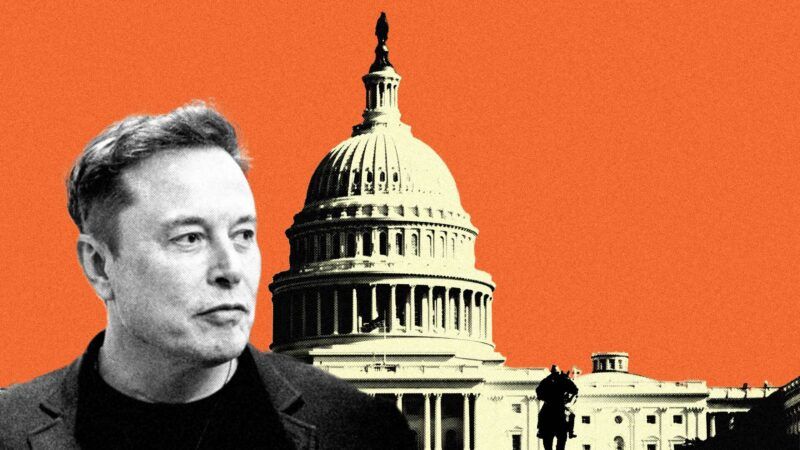Elon Musk Is Right. The 'Big Beautiful Bill' Is a Bad Deal.
Musk's opinion about the bill matters, since he is one of the few people in conservative politics who can get away with defying Trump.

Elon Musk says he's "disappointed" to see the House pass a major tax bill that will require the federal government to borrow trillions of additional dollars in the coming years.
The bill, which faces an uncertain future in the Senate, "undermines the work that the [Department of Government Efficiency] team is doing," Musk told CBS News on Sunday.
He's right. While DOGE has not been able to fully deliver on the grand promises Musk made during last year's campaign and during the transition process, President Donald Trump's One Big Beautiful Bill Act moves the federal budget in the complete opposite direction. The Congressional Budget Office (CBO) estimates that the bill would add $2.3 trillion to the deficit over the next 10 years—and that's a rosy projection that includes several gimmicks meant to reduce the apparent impact of the bill. Estimates by independent entities like the Yale Budget Lab and the Penn Wharton Budget Model expect it to add over $3 trillion to the deficit, as written, and potentially as much as $5 trillion once the gimmicks are stripped away.
By comparison, DOGE expects to trim federal spending by about $170 billion this year, and it looks like Congress may only implement a tiny fraction of those cuts.
The bill does include some sizable spending cuts, largely aimed at Medicaid, which provides health insurance for the poor. The bill would establish new work requirements for Medicaid recipients who are childless adults without disabilities. It would also close a loophole that states have used to collect larger sums of federal Medicaid payments by taxing nursing homes and other medical facilities. Those are worthwhile maneuvers—and despite Democratic talking points about Medicaid "cuts," overall Medicaid spending will keep growing under the bill.
However, those cuts are swamped by the budgetary consequences of extending the 2017 tax cuts and adding to them—the bill would include Trump's chaotic plans to exempt tips, Social Security income, car loans, and overtime from federal taxes. It would also create new tax-sheltered savings accounts, and it would increase spending on a number of conservative priorities like the military and border enforcement.
"I think a bill can be big or it can be beautiful," Musk told CBS News. "But I don't know if it can be both."
In a lot of ways, the Big Beautiful Bill is simply the latest version of an intra-Republican debate that's been ongoing for decades: Is fiscal responsibility a talking point or a serious policy goal? The specifics change, but when push comes to shove, the GOP has consistently (though not always) chosen spending increases and tax cuts, even when those proposals will make the budget deficit worse and add to the national debt.
Against that backdrop, Musk's criticism of the bill seems significant. Though he has stepped back from his public role in the Trump administration, Musk remains a star in the broader conservative movement and one of the few people who might be able to get away with openly disagreeing with the president.
I've been critical of Musk and his DOGE project, but I think it's now clear that Musk's strongest skill (at least within government) is diagnosing problems that people within the political system might not see or choose to ignore. The underwhelming performance of DOGE as a budget-cutting entity has several causes—which Reason has detailed at length—but Musk was absolutely right when he said federal spending needs to be slashed and that the government wastes too much of taxpayers' dollars. He's right, again, to say that the Big Beautiful Bill makes those problems worse.
And by speaking up, he might give some cover to the senators who will decide the bill's fate. At least one of them is already sending the same message as Musk.
"I think the cuts currently in the bill are wimpy and anemic, but I still would support the bill, even with wimpy and anemic cuts, if they weren't going to explode the debt," Sen. Rand Paul (R–Ky.) told Fox News on Sunday. "The problem is the math doesn't add up."
